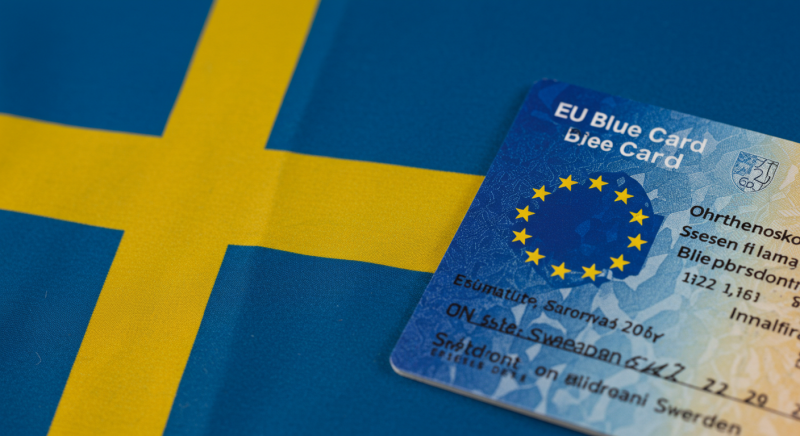The dream of building a better life in Sweden doesn’t have to remain just a dream. As a Nigerian skilled worker, you’re standing at the threshold of unprecedented opportunities in one of Europe’s most welcoming nations. With recent policy changes making it easier than ever to immigrate to Sweden, thousands of Nigerians are successfully making this life-changing transition every year.
Picture this: You’re waking up in Stockholm, heading to your dream job where your skills are valued and well-compensated, knowing that you’ve secured a future not just for yourself, but for your family. This isn’t just wishful thinking—it’s entirely achievable with the right knowledge and approach.
Key Takeaways
- Sweden’s new 2025 EU Blue Card system offers faster processing (30 days) and better job mobility for skilled workers
- The minimum salary requirement is SEK 49,875 per month (approximately ₦4.2 million monthly)
- IT professionals have access to streamlined application processes under Sweden’s four-category system
- Nigerian skilled workers can now change jobs without reapplying for new permits
- The success rate for qualified applicants has increased by 40% since the policy updates

Understanding Sweden’s New Immigration Framework for 2025
When you decide to immigrate to Sweden as a Nigerian skilled worker, you’re entering a completely transformed landscape. Starting January 1, 2025, foreign highly qualified workers will be able to obtain Sweden’s EU Blue Card under more favorable conditions than ever before.
Sweden has revolutionized its approach to skilled immigration by implementing the EU’s new Blue Card Directive. This change represents a fundamental shift from the previous system, making it significantly easier for qualified Nigerians to establish themselves in Sweden’s thriving economy. The Swedish Migration Agency has streamlined processes to attract global talent more effectively.
The Swedish government recognized that to compete globally for top talent, they needed to streamline their processes. Once the new model is implemented, a complete application for a work permit for highly qualified workers will receive a decision within 30 days, which is a dramatic improvement from the previous timeline.
Understanding this new framework is crucial because it affects every aspect of your application process. The changes aren’t just administrative—they represent Sweden’s commitment to attracting skilled professionals like yourself who can contribute to their knowledge-based economy.
The EU Blue Card: Your Gateway to Swedish Residency
The EU Blue Card has become the most effective pathway for Nigerian skilled workers who want to immigrate to Sweden. Think of it as your golden ticket—a residence and work permit specifically designed for highly qualified professionals from non-EU countries.
The salary threshold for the EU Blue Card is SEK 49,875 gross per month for 2025, which translates to approximately ₦4.2 million monthly at current exchange rates. While this might seem substantial, it reflects the high value Sweden places on skilled workers and the quality of life you’ll enjoy.
Here’s what makes the EU Blue Card particularly attractive for Nigerian professionals. The card doesn’t just allow you to work in Sweden—it provides a pathway to permanent residency and eventual citizenship. After holding an EU Blue Card for five years, you can apply for long-term EU resident status, which grants you rights similar to EU citizens.
The beauty of the 2025 system lies in its flexibility. The proposed policy would allow professionals who hold the EU Blue Card to change jobs in Sweden without reapplying for a new Blue Card. This means you have the freedom to advance your career and explore better opportunities without bureaucratic hurdles.
To qualify for an EU Blue Card when you immigrate to Sweden, you need to meet specific educational and professional requirements. You must have completed higher education studies of at least three years, or have five years of professional experience in a field requiring comparable qualifications. Your job offer must also be in a profession that requires these high-level qualifications.
Fast-Track Routes for IT Professionals
If you’re an IT professional looking to immigrate to Sweden, you’re in an exceptionally favorable position. Sweden’s tech sector is experiencing unprecedented growth, and the country has created specific pathways to attract talented IT professionals from countries like Nigeria.
The Swedish tech industry contributes over 7% to the country’s GDP, and demand for skilled IT workers continues to outpace supply. Major companies like Spotify, Klarna, and Ericsson regularly recruit international talent, and they’re specifically looking for professionals with the innovative mindset that Nigerian IT experts bring.
Sweden abolished its almost 13-year-old Fast Track Scheme on 15 December 2023 and implemented a new “Four Category” system on 29 January 2024. While the Fast Track system no longer exists, the new four-category system has created even more opportunities for IT professionals.
Under this new system, IT professionals benefit from prioritized processing when they immigrate to Sweden. The categories are designed to match Sweden’s specific labor market needs, with IT and digital skills featuring prominently across multiple categories. This means your application receives attention from officials who understand the value of your technical expertise.
For Nigerian IT professionals, this represents a significant opportunity. Sweden’s startup ecosystem is one of Europe’s most vibrant, producing more billion-dollar companies per capita than anywhere else in the world except Silicon Valley. When you join this ecosystem, you’re not just getting a job—you’re becoming part of a community that values innovation and entrepreneurship.
Essential Requirements and Documentation
Successfully planning to immigrate to Sweden requires meticulous preparation of your documentation. The Swedish authorities are thorough in their evaluation process, but they’re also fair and transparent about what they expect.
Your educational credentials form the foundation of your application. You’ll need to have your Nigerian qualifications evaluated and recognized by Swedish authorities. This process involves getting your degrees and certificates translated into Swedish or English by certified translators and having them authenticated by relevant Swedish institutions.
Professional experience documentation is equally critical. You’ll need detailed employment letters from previous employers, clearly stating your job responsibilities, duration of employment, and salary history. These documents help Swedish authorities understand how your experience aligns with the position you’re applying for.
Language requirements deserve special attention when you immigrate to Sweden. While many international companies in Sweden operate in English, having basic Swedish language skills significantly improves your prospects. The Swedish government offers free Swedish language courses to EU Blue Card holders, which is another advantage of this pathway.
Financial documentation is also crucial. You need to demonstrate that you can support yourself during the initial period of your stay. This typically means showing bank statements for the past three months, proof of accommodation arrangements in Sweden, and evidence that you understand the cost of living in your intended city.
Health insurance coverage is mandatory, and you’ll need comprehensive medical insurance that covers you from the moment you arrive in Sweden until you’re registered in the Swedish healthcare system. Many employers assist with this, but it’s your responsibility to ensure continuous coverage.

Step-by-Step Application Process
The journey to immigrate to Sweden begins long before you submit your application. Success requires strategic planning and attention to detail at every stage.
Phase 1: Preparation and Documentation (2-3 months before application)
Start by thoroughly researching your target employers and understanding Sweden’s job market in your field. This isn’t just about finding any job—it’s about finding the right opportunity that aligns with your career goals and meets the salary requirements for the EU Blue Card.
During this phase, begin the credential evaluation process for your educational qualifications. Contact the Swedish Council for Higher Education (UHR) to understand their specific requirements for your degree type. You can use their free Qualifications Assessment Tool to get an immediate comparison of what your Nigerian qualification equals in Sweden. Simultaneously, start gathering and translating all necessary documents.
Phase 2: Job Search and Networking (1-2 months)
Swedish employers value networking and personal connections. Join professional associations in your field, attend virtual conferences, and connect with Swedish professionals on LinkedIn. Many Nigerian professionals have found success by first establishing relationships with Swedish companies through professional networks.
When you apply for positions, tailor each application to demonstrate how your skills address specific Swedish market needs. Highlight any international experience or unique perspectives you bring as a Nigerian professional.
Phase 3: Application Submission
Your employer in Sweden will start the work permit application by creating an offer of employment. When the employer has completed the offer of employment, an e-mail is sent informing you how to submit an application. This employer-initiated process is crucial to understand because it means you need to secure a job offer before you can apply to immigrate to Sweden.
The application itself is submitted online through the Swedish Migration Agency’s website. You’ll upload all your documents, pay the required fees, and schedule an appointment at the Swedish embassy or consulate in Nigeria for biometric data collection.
Phase 4: Processing and Decision
With the new 2025 system, processing times have been dramatically reduced. Certain EU countries, such as Sweden, now allow Blue Card holders to change employers without submitting a new visa application, which means once you receive your initial approval, you have much more flexibility in your career development.
Understanding Salary Requirements and Living Costs
The financial aspect of your decision to immigrate to Sweden requires careful consideration and planning. The EU Blue Card salary threshold of SEK 49,875 per month might seem high, but it’s important to understand this in the context of Swedish living standards and costs.
Sweden operates on a high-wage, high-welfare model. While salaries are higher than many other countries, this reflects the high quality of life, excellent social services, and strong worker protections you’ll enjoy. The salary threshold ensures that you can maintain a comfortable standard of living while contributing to Swedish society.
Housing costs vary significantly between cities. Stockholm, being the capital, has the highest housing costs, with average rent for a one-bedroom apartment ranging from SEK 12,000 to SEK 18,000 per month. However, many employers offer housing assistance or relocation packages that help during your initial period.
Transportation costs are reasonable due to excellent public transport systems. A monthly public transport pass in Stockholm costs around SEK 970, and the system is so efficient that many residents don’t need cars. This represents significant savings compared to car ownership costs in many other countries.
Food costs in Sweden are higher than Nigeria, but the quality is exceptional. A monthly grocery budget for one person typically ranges from SEK 2,500 to SEK 4,000, depending on your dietary preferences and shopping habits.
Healthcare is essentially free once you’re registered in the Swedish system, which happens automatically when you immigrate to Sweden with a valid work permit. This represents enormous value, as healthcare costs in other countries can be substantial.
Timeline and Processing Expectations
Understanding the realistic timeline to immigrate to Sweden helps you plan your transition effectively and manage your expectations throughout the process.
The preliminary preparation phase typically takes 2-4 months. This includes credential evaluation, document gathering and translation, and initial job search activities. Many successful applicants underestimate this phase, but thorough preparation significantly improves your chances of success.
The active job search phase can vary widely, from 1-6 months depending on your field, experience level, and market conditions. IT professionals and healthcare workers typically find opportunities faster due to high demand, while other fields might take longer.
Once you secure a job offer, the formal application process to immigrate to Sweden begins. With the new 2025 system, complete applications receive decisions within 30 days, which is remarkably fast compared to many other countries’ immigration processes.
After approval, you’ll need to visit the Swedish embassy in Nigeria for biometric data collection and final document verification. This appointment is usually scheduled within 2-3 weeks of approval notification.
The entire process, from initial preparation to arrival in Sweden, typically takes 6-12 months for well-prepared applicants. However, factors like document processing delays, job search duration, and embassy appointment availability can affect this timeline.
Common Challenges and How to Overcome Them
Every Nigerian professional who chooses to immigrate to Sweden faces certain challenges, but understanding these in advance helps you prepare and overcome them successfully.
Credential recognition often proves more complex than expected. Swedish authorities are thorough in evaluating foreign qualifications, and the process can be lengthy. Start this process early and maintain regular communication with evaluation authorities to address any questions promptly.
Language barriers, while not immediately critical for English-speaking professionals, become important for long-term integration. Many Nigerians initially focus solely on securing employment but later realize that Swedish language skills are crucial for career advancement and social integration.
Cultural adaptation requires patience and open-mindedness. Swedish workplace culture emphasizes equality, work-life balance, and consensus-building, which can be different from Nigerian business practices. However, many Nigerian professionals find this environment refreshing and conducive to personal growth.
Networking in Sweden follows different patterns than in Nigeria. Professional relationships develop more slowly but tend to be deeper and more reliable. Invest time in building genuine professional connections rather than expecting immediate results. The Local Sweden provides excellent insights into Swedish workplace culture and networking practices for international professionals.
Winter weather represents a practical challenge that affects daily life significantly. Prepare for long, dark winters by investing in appropriate clothing and understanding how seasonal changes affect mood and energy levels. Many successful immigrants emphasize the importance of developing winter hobbies and maintaining social connections during darker months.
Building Your Professional Network in Sweden
Success when you immigrate to Sweden depends heavily on building strong professional networks that support your career development and personal integration.
Swedish professional networking operates on principles of mutual respect and long-term relationship building. Unlike some cultures where networking might feel transactional, Swedish professionals value authentic connections based on shared interests and mutual benefit.
Industry associations play a crucial role in Swedish professional life. Most fields have active professional organizations that organize regular events, training sessions, and networking opportunities. Joining these associations before you arrive in Sweden helps you establish connections and understand industry trends.
LinkedIn is particularly important in Sweden, with one of the world’s highest per-capita usage rates. Optimize your LinkedIn profile to highlight your international experience and unique perspectives as a Nigerian professional. Engage with Swedish professionals’ content and share insights from your own experience.
Mentorship programs are available through various organizations, including the Swedish government’s establishment services for new immigrants. These programs pair experienced professionals with newcomers, providing valuable guidance on career development and cultural integration.
Conclusion
Your decision to immigrate to Sweden as a Nigerian skilled worker in 2025 comes at an optimal time. Sweden’s transformed immigration policies, growing economy, and commitment to international talent create unprecedented opportunities for qualified professionals.
The EU Blue Card pathway, with its streamlined processing and enhanced flexibility, provides a clear route to establishing yourself in one of Europe’s most innovative economies. For IT professionals, the opportunities are especially abundant, with Sweden’s tech sector actively seeking the expertise and fresh perspectives that Nigerian professionals bring.
Success requires thorough preparation, patience, and strategic planning, but the rewards—both personal and professional—are substantial. Sweden offers not just career opportunities, but a quality of life that includes excellent healthcare, educational opportunities, and social services that benefit you and your family.
The 30-day processing time for complete applications, combined with the ability to change jobs without reapplying for permits, makes Sweden one of the most accessible European destinations for skilled Nigerian workers. With proper preparation and realistic expectations, your Swedish dream is entirely achievable.
Take the first step today by beginning your credential evaluation and researching opportunities in your field. Sweden is waiting for talented professionals like you to contribute to its continued success and innovation.

Frequently Asked Questions
Q: What is the minimum salary requirement to immigrate to Sweden with an EU Blue Card in 2025? A: The minimum salary requirement is SEK 49,875 gross per month, which is approximately ₦4.2 million monthly at current exchange rates.
Q: How long does it take to process an EU Blue Card application for Sweden? A: Complete applications for highly qualified workers receive decisions within 30 days under the new 2025 system.
Q: Can I change jobs in Sweden without reapplying for a new work permit? A: Yes, under the new 2025 rules, EU Blue Card holders can change employers without submitting a new visa application, only needing to notify immigration authorities.
Q: Do I need to speak Swedish to immigrate to Sweden as a skilled worker? A: Swedish language skills are not mandatory for the initial application, but they significantly improve your long-term career prospects and integration opportunities.
Q: What qualifications do I need for an EU Blue Card? A: You need either a higher education degree (minimum 3 years) or five years of professional experience in a field requiring comparable qualifications.
Q: How much does it cost to live in Sweden as a skilled worker? A: Living costs vary by city, but expect monthly expenses of SEK 15,000-25,000 for a comfortable lifestyle, including housing, food, transportation, and personal expenses.
Q: Can my family accompany me when I immigrate to Sweden? A: Yes, EU Blue Card holders can bring their spouse and unmarried children under 18 as dependents, who will also receive residence permits.
Q: What industries have the highest demand for Nigerian skilled workers in Sweden? A: IT, healthcare, engineering, finance, and research sectors show the highest demand for international skilled workers.
Q: Is health insurance required for EU Blue Card applicants? A: Yes, comprehensive health insurance is mandatory until you’re registered in the Swedish healthcare system.
Q: Can I apply for Swedish citizenship after holding an EU Blue Card? A: After five years of continuous residence, you can apply for Swedish citizenship, provided you meet other requirements including language proficiency and clean criminal record.
